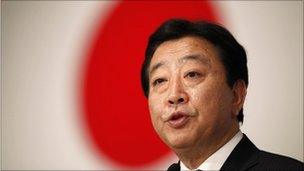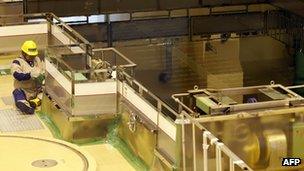Profile: Yoshihiko Noda
- Published

Mr Noda is Japan's sixth prime minister in five years
Minutes after being chosen as Democratic Party (DPJ) leader, Yoshihiko Noda promised to create a "stable, reliable and mature" political environment.
But the 55-year-old has faced multiple challenges to restore faith in government among the Japanese public, who have seen six prime ministers in the last six years.
Mr Noda has faced criticism over issues including nuclear energy, a controversial sales tax increase and the government's handling of disputed islands with China.
He survived a DPJ leadership vote in September, when he was re-elected president by a convincing majority.
But he now faces opposition leader and former Prime Minister Shinzo Abe in a general election from which he appears unlikely to emerge triumphant.
Dip in popularity
The prime minister, seen by some as a hard worker willing to make correct but tough choices, has consistently faced low approval figures from the public.
Japan's 50 reactors were shut down for routine maintenance amid the crisis at the Fukushima power plant, which was triggered by a massive earthquake and tsunami in 2011.
Mr Noda ordered the restart of two nuclear reactors in June despite widespread public opposition, saying Japan faced a summer of power shortages.
But he then wavered in public over the future of nuclear power in the country - a debate which currently strikes a deep chord with the public.
His popularity also took a hit over the move to double sales tax from 5% to 10% by 2015, which many analysts say was necessary to tackle economic woes.
Mr Noda said that the hike was key to cutting Japan's high public debt and funding rising welfare costs.
He was able to rally opposition support for the tax to be passed in parliament in August, but this came at a price. More than 50 lawmakers opposed to the tax left the ruling party.

There have been a series of public protests over nuclear energy use
Former DPJ stalwart Ichiro Ozawa, who used to have the largest faction, formed his own party as a result of the disagreement.
Mr Noda's government has also faced criticism over its handling of disputed islands with China.
The two neighbours are embroiled in a row over islands known as Senkaku in Japan and Diaoyu in China. Japan controls the islands, which Taiwan also claims.
The government's acquisition of three of the islands from their private Japanese owner in September sparked both diplomatic and public protests in China. Tensions between Tokyo and Beijing remain severely strained.
Charisma and style?
Yoshihiko Noda grew up in Chiba, to the east of Tokyo. Unlike many Japanese lawmakers, he does not hail from a political dynasty - his father was in the military.
A graduate of Waseda University and then the Matsushita Institute of Government and Management, he was involved in local politics before his election to parliament in 1993.
He was elected as a candidate for the Japan New Party, which is now defunct, but went on to join the DPJ in 2000.
After serving in key party roles, he was named finance minister in June 2010 and elected to the party leadership in August 2011.
The preferred candidate of financial markets, Mr Noda is known as a fiscal hawk and seen as a relatively safe pair of hands.
He has said in the past that reliability, rather than charisma and style, are his selling points.
"I am an ordinary man. I do not have large financial resources," he wrote in a magazine. "I am not stylish and my looks are not my selling point."
He is known as a judo fan and is married with two children.